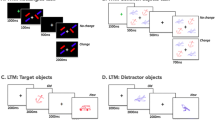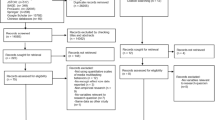Abstract
Previous research (Ophir et al. in Proc Natl Acad Sci 106(37):15583–15587, 10.1073/pnas.0903620106, 2009; Uncapher and Wagner in Proc Natl Acad Sci 115(40):9889-9896, 10.1073/pnas.1611612115, 2018; Wiradhany and Koerts in Media Psychol 24(2):276–303, 10.1080/15213269.2019.1685393, 2021) suggested that different groups (high, low, and moderate) of habitual media multitaskers process information differently. Most of these studies focused on comprehending the cognitive differences among them. But there is considerably less information on their differences in processing emotional stimuli. In this article, using self-referential emotional stimuli (‘positive/likeable’ and ‘negative/dislikeable’ words), we aim to examine whether there is any difference in the self-referential emotional memory among different groups of media multitaskers (HMM, MMM, and LMM) using a recall and recognition paradigm. We also investigate whether HMM, MMM, and LMM vary in an emotional categorization task. A total of 120 students (mean age = 20.9 years; males = 84) voluntarily participated and self-reported their preferences for media multitasking using a questionnaire (Ophir et al. 2009). A total of 50 self-referenced words (positive/likeable and negative/dislikeable) were presented to them on a computerized screen for an emotional categorization task. Afterward, they performed a surprise free recall and a recognition task of the same words. Results suggested that HMM were faster in liking ‘positive/likeable’ words over ‘negative/dislikeable’ words in emotional categorization tasks in comparison with LMM and MMM. HMM and MMM performed poorly in both the recall and recognition of ‘positive/likeable’ emotional words compared to LMM. No significant difference was observed in recall and recognition between HMM and MMM. The three groups did not differ significantly in the recall and recognition tasks related to ‘negative/dislikeable’ emotional words. These findings help understand the differences in processing self-related emotional stimuli among different groups of media multitaskers.



Similar content being viewed by others
Explore related subjects
Discover the latest articles and news from researchers in related subjects, suggested using machine learning.Notes
In the current study, participants were instructed to imagine themselves overhearing someone describing them using each of the words used. Their task was to respond, as quickly and accurately as possible, whether they would like or dislike to be described by each of the personality words.
The study was a part of big study. During 15–20 min gap, participants performed some tasks with pictographic stimuli, and no words were involved in those tasks. Also, the experiment was held in a strict laboratory environment in a one-to-one setting to avoid any distraction. This ensured that the recognition/recall tasks were not influenced by other external factors.
References
Adler RF, Benbunan-Fich R (2013) Self-interruptions in discretionary multitasking. Comput Hum Behav 29(4):1441–1449. https://doi.org/10.1016/j.chb.2013.01.040
Alzahabi R, Becker MW (2013) The association between media multitasking, task-switching, and dual-task performance. J Exp Psychol Hum Percept Perform 39(5):1485–1495. https://doi.org/10.1037/a0031208
Anderson NH (1968) Likableness ratings of 555 personality-trait words. J Pers Soc Psychol 9(3):272–279. https://doi.org/10.1037/h0025907
Angell R, Gorton M, Sauer J, Bottomley P, White J (2016) Don’t distract me when I’m media multitasking: toward a theory for raising advertising recall and recognition. J Advert 45(2):198–210. https://doi.org/10.1080/00913367.2015.1130665
Becker MW, Alzahabi R, Hopwood CJ (2013) Media multitasking is associated with symptoms of depression and social anxiety. Cyberpsychol Behav Soc Netw 16(2):132–135. https://doi.org/10.1089/cyber.2012.0291
Bentley SV, Greenaway KH, Haslam SA (2017) An online paradigm for exploring the self-reference effect. PLoS ONE 12(5):e0176611. https://doi.org/10.1371/journal.pone.0176611
Beuckels E, Ye G, Hudders L, Cauberghe V (2021) Media multitasking: a bibliometric approach and literature review. Front Psychol. https://doi.org/10.3389/fpsyg.2021.623643
Blake AG, Chung L (2000) Background television and reading memory in context: assessing TV interference and facilitative context effects on encoding versus retrieval processes. Commun Res 27(3):327–352. https://doi.org/10.1177/009365000027003003
Blume C, del Giudice R, Lechinger J, Wislowska M, Heib DPJ, Hoedlmoser K, Schabus M (2017) Preferential processing of emotionally and self-relevant stimuli persists in unconscious N2 sleep. Brain Lang 167:72–82. https://doi.org/10.1016/j.bandl.2016.02.004
Cain MS, Mitroff SR (2011) Distractor filtering in media multitaskers. Perception 40(10):1183–1192. https://doi.org/10.1068/p7017
Cardoso-Leite P, Kludt R, Vignola G, Ma WJ, Green CS, Bavelier D (2016) Technology consumption and cognitive control: contrasting action video game experience with media multitasking. Atten Percept Psychophys 78(1):218–241. https://doi.org/10.3758/s13414-015-0988-0
Denny EB, Hunt RR (1992) Affective valence and memory in depression: dissociation of recall and fragment completion. J Abnorm Psychol 101(3):575–580. https://doi.org/10.1037//0021-843x.101.3.575
Fields EC, Kuperberg GR (2015) Loving yourself more than your neighbor: ERPs reveal online effects of a self-positivity bias. Soc Cogn Affect Neurosci 10(9):1202–1209. https://doi.org/10.1093/scan/nsv004
Fox J, Rooney MC (2015) The Dark Triad and trait self-objectification as predictors of men’s use and self-presentation behaviors on social networking sites. Personal Individ Differ 76:161–165. https://doi.org/10.1016/j.paid.2014.12.017
Herbert C, Pauli P, Herbert BM (2011) Self-reference modulates the processing of emotional stimuli in the absence of explicit self-referential appraisal instructions. Soc Cogn Affect Neurosci 6(5):653–661. https://doi.org/10.1093/scan/nsq082
Jeong S-H, Hwang Y (2016) Media multitasking effects on cognitive vs. attitudinal outcomes: a meta-analysis: media multitasking effects. Human Commun Res 42(4):599–618. https://doi.org/10.1111/hcre.12089
Klein SB, Loftus J, Burton HA (1989) Two self-reference effects: the importance of distinguishing between self-descriptiveness judgments and autobiographical retrieval in self-referent encoding. J Pers Soc Psychol 56(6):853–865. https://doi.org/10.1037/0022-3514.56.6.853
Lee M, Murphy K, Andrews G (2019) Using media while interacting face-to-face is associated with psychosocial well-being and personality traits. Psychol Rep 122(3):944–967. https://doi.org/10.1177/0033294118770357
Lin L (2009) Breadth-biased versus focused cognitive control in media multitasking behaviors. Proc Natl Acad Sci 106(37):15521–15522. https://doi.org/10.1073/pnas.0908642106
Madore KP, Khazenzon AM, Backes CW, Jiang J, Uncapher MR, Norcia AM, Wagner AD (2020) Memory failure predicted by attention lapsing and media multitasking. Nature. https://doi.org/10.1038/s41586-020-2870-z
Mandler G (1987) Remembering. In: Gregory RL (ed) The Oxford companion to the mind. Oxford University Press, pp 679–680
Mathôt S, Schreij D, Theeuwes J (2012) OpenSesame: an open-source, graphical experiment builder for the social sciences. Behav Res Methods 44(2):314–324. https://doi.org/10.3758/s13428-011-0168-7
May KE, Elder AD (2018) Efficient, helpful, or distracting? A literature review of media multitasking in relation to academic performance. Int J Educ Technol High Educ 15(1):13. https://doi.org/10.1186/s41239-018-0096-z
Mezulis AH, Abramson LY, Hyde JS, Hankin BL (2004) Is there a universal positivity bias in attributions? A meta-analytic review of individual, developmental, and cultural differences in the self-serving attributional bias. Psychol Bull 130(5):711–747. https://doi.org/10.1037/0033-2909.130.5.711
Minear M, Brasher F, McCurdy M, Lewis J, Younggren A (2013) Working memory, fluid intelligence, and impulsiveness in heavy media multitaskers. Psychon Bull Rev 20(6):1274–1281. https://doi.org/10.3758/s13423-013-0456-6
Müller SM, Schiebener J, Brand M, Liebherr M (2021) Decision-making, cognitive functions, impulsivity, and media multitasking expectancies in high versus low media multitaskers. Cogn Process 22(4):593–607. https://doi.org/10.1007/s10339-021-01029-2
Murphy K, McLauchlan S, Lee M (2017) Is there a link between media-multitasking and the executive functions of filtering and response inhibition? Comput Hum Behav 75:667–677. https://doi.org/10.1016/j.chb.2017.06.001
Ophir E, Nass C, Wagner AD (2009) Cognitive control in media multitaskers. Proc Natl Acad Sci 106(37):15583–15587. https://doi.org/10.1073/pnas.0903620106
Parry DA, Le Roux DB (2021) “Cognitive control in media multitaskers” ten years on: A meta-analysis. Cyberpsychol J Psychos Res Cyberspace. https://doi.org/10.5817/CP2021-2-7
Popławska A, Szumowska E, Kuś J(2021) Why do we need media multitasking? A self-regulatory perspective. Front Psychol 12(Article 624649), 1–10. https://doi.org/10.3389/fpsyg.2021.624649
Przybylski AK, Murayama K, DeHaan CR, Gladwell V (2013) Motivational, emotional, and behavioral correlates of fear of missing out. Comput Hum Behav 29(4):1841–1848. https://doi.org/10.1016/j.chb.2013.02.014
Reinecke L (2016) Mood management theory. In: Rössler P, Hoffner CA, van Zoonen L (eds) The international encyclopedia of media effects. Wiley, New York., pp 1–13. https://doi.org/10.1002/9781118783764.wbieme0085
Le Roux DB, Parry DA (2019) Investigating differences in the attention distribution strategies of high and low media multitaskers through a two-dimensional game. Cyberpsychol J Psychosoc Res Cyberspace. https://doi.org/10.5817/CP2019-3-2
Sanbonmatsu DM, Strayer DL, Medeiros-Ward N, Watson JM (2013) Who Multi-Tasks and Why? Multi-Tasking Ability, Perceived Multi-Tasking Ability, Impulsivity, and Sensation Seeking. PLoS ONE 8(1):e54402. https://doi.org/10.1371/journal.pone.0054402
Schütz E (2015) The affective profile model: ill-being and well-being. https://gupea.ub.gu.se/handle/2077/38582
Seddon AL, Law AS, Adams A-M, Simmons FR (2018) Exploring the relationship between executive functions and self-reported media-multitasking in young adults. J Cogn Psychol 30(7):728–742. https://doi.org/10.1080/20445911.2018.1525387
Shin M, Kemps E (2020) Media multitasking as an avoidance coping strategy against emotionally negative stimuli. Anxiety Stress Coping 33(4):440–451. https://doi.org/10.1080/10615806.2020.1745194
Shukla S, Sharma P (2018) Emotions and media multitasking behaviour among Indian college students. J Creat Commun 13(3):197–211. https://doi.org/10.1177/0973258618790794
Shukla S (2016) Media multitaskers and attentional bias toward emotional stimuli. In: Leung M-T, Tan LM (eds) Applied psychology readings. Springer, Berlin, pp 39–46. https://doi.org/10.1007/978-981-10-2796-3_3
Sorokowski P, Sorokowska A, Oleszkiewicz A, Frackowiak T, Huk A, Pisanski K (2015) Selfie posting behaviors are associated with narcissism among men. Personal Individ Differ 85:123–127. https://doi.org/10.1016/j.paid.2015.05.004
Speed BC, Nelson BD, Auerbach RP, Klein DN, Hajcak G (2016) Depression risk and electrocortical reactivity during self-referential emotional processing in 8 to 14 year-old girls. J Abnorm Psychol 125(5):607–619. https://doi.org/10.1037/abn0000173
Srivastava J, Nakazawa M, Chen Y-W (2016) Online, mixed, and offline media multitasking: role of cultural, socio-demographic, and media factors. Comput Hum Behav 62:720–729. https://doi.org/10.1016/j.chb.2016.04.040
Symons CS, Johnson BT (1997) The self-reference effect in memory: a meta-analysis. Psychol Bull 121(3):371–394. https://doi.org/10.1037/0033-2909.121.3.371
Uncapher MR, Wagner AD (2018) Minds and brains of media multitaskers: current findings and future directions. Proc Natl Acad Sci 115(40):9889–9896. https://doi.org/10.1073/pnas.1611612115
Uncapher MR, Thieu KM, Wagner AD (2016) Media multitasking and memory: differences in working memory and long-term memory. Psychon Bull Rev 23(2):483–490. https://doi.org/10.3758/s13423-015-0907-3
van der Schuur WA, Baumgartner SE, Sumter SR, Valkenburg PM (2015) The consequences of media multitasking for youth: A review. Comput Hum Behav 53:204–215. https://doi.org/10.1016/j.chb.2015.06.035
Wang Z, Tchernev JM (2012) The “Myth” of media multitasking: reciprocal dynamics of media multitasking, personal needs, and gratifications. J Commun 62(3):493–513. https://doi.org/10.1111/j.1460-2466.2012.01641.x
Warriner AB, Kuperman V, Brysbaert M (2013) Norms of valence, arousal, and dominance for 13,915 English lemmas. Behav Res Methods 45(4):1191–1207. https://doi.org/10.3758/s13428-012-0314-x
Watson LA, Dritschel B, Jentzsch I, Obonsawin MC (2008) Changes in the relationship between self-reference and emotional valence as a function of dysphoria. Br J Psychol 99(1):143–152. https://doi.org/10.1348/000712607X248689
Winter D (2016) Attention to emotional stimuli in borderline personality disorder—a review of the influence of dissociation, self-reference, and psychotherapeutic interventions. Borderline Personal Disord Emotion Dysregul 3(article 11), 1–12. https://doi.org/10.1186/s40479-016-0047-z
Wiradhany W, Koerts J (2021) Everyday functioning-related cognitive correlates of media multitasking: a mini meta-analysis. Media Psychol 24(2):276–303. https://doi.org/10.1080/15213269.2019.1685393
Zhou H, Guo J, Ma X, Zhang M, Liu L, Feng L, Yang J, Wang Z, Wang G, Zhong N (2017) Self-reference emerges earlier than emotion during an implicit self-referential emotion processing task: event-related potential evidence. Front Hum Neurosci 11(Article 451), 1–11. https://doi.org/10.3389/fnhum.2017.00451
Acknowledgements
The author thanks the University Grants Commission, the Government of India and the Indian Institute of Technology Indore for the financial and technical resources.
Author information
Authors and Affiliations
Corresponding author
Ethics declarations
Conflict of interests
No conflict of interest to disclose.
Ethical approval
The research protocol was defended before a research progress committee of the institute.
Additional information
Editors: Valerio Santangelo (University of Perugia), Claudia Del Gatto (European University of Rome); Reviewers: Four researchers who prefer to remain anonymous.
Publisher's Note
Springer Nature remains neutral with regard to jurisdictional claims in published maps and institutional affiliations.
Supplementary Information
Below is the link to the electronic supplementary material.
Rights and permissions
Springer Nature or its licensor (e.g. a society or other partner) holds exclusive rights to this article under a publishing agreement with the author(s) or other rightsholder(s); author self-archiving of the accepted manuscript version of this article is solely governed by the terms of such publishing agreement and applicable law.
About this article
Cite this article
Shukla, S. High media multitasking habit influences self-referential emotional memory. Cogn Process 24, 71–81 (2023). https://doi.org/10.1007/s10339-022-01119-9
Received:
Accepted:
Published:
Issue Date:
DOI: https://doi.org/10.1007/s10339-022-01119-9
Keywords
Profiles
- Shanu Shukla View author profile




